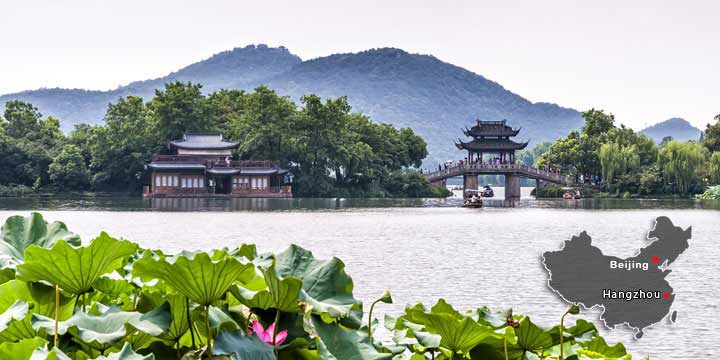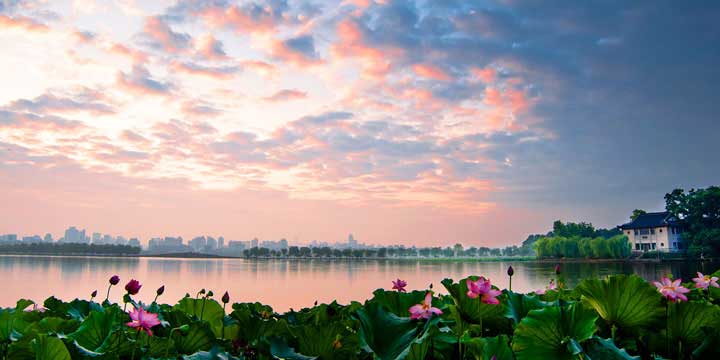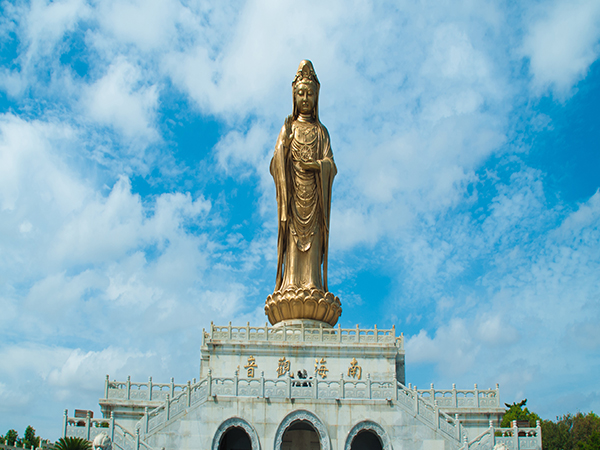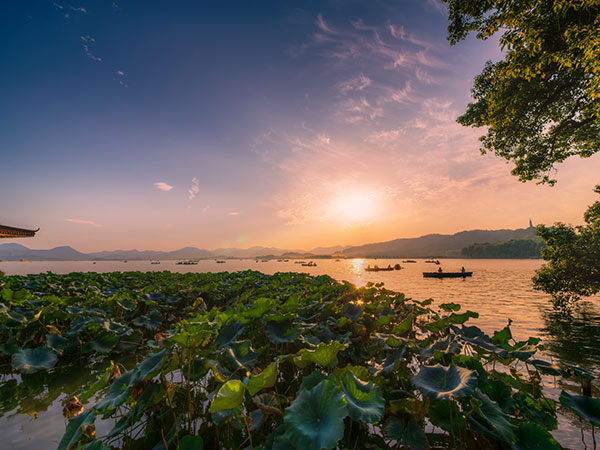Hangzhou is one of China's big tourist attractions. It has many historical relics and scenic spots, including West Lake, and the scenic area near the Fuchun River and the Xinan River. The special local-made products are silk, Xihu silk umbrellas, color-glazed porcelain, Longjing tea, and white chrysanthemum.
 Hangzhou is located on the lower reaches of the Qiantang River in southeast China, a superior position in the Yangtze Delta and only 180 kilometers from Shanghai. Hangzhou is one of China's major textile industry centers, and the largest producer of gunnysacks in China. Furthermore it is noted for its silk, paper, wireless communication equipment, food processing, and handcraft, steel, chemical products, machinery, rubber, construction materials, and electronic equipment are also produced here. Now the Hangzhou High-Technical Development Zone and the Qiantang River Investment Zone are being established. The chief farm products include rice, wheat, cotton, silkworm cocoons, tea, and freshwater fish.
With good rail water, air, and road transportation facilities, Hangzhou is a junction of inter-country links.
Hangzhou is located on the lower reaches of the Qiantang River in southeast China, a superior position in the Yangtze Delta and only 180 kilometers from Shanghai. Hangzhou is one of China's major textile industry centers, and the largest producer of gunnysacks in China. Furthermore it is noted for its silk, paper, wireless communication equipment, food processing, and handcraft, steel, chemical products, machinery, rubber, construction materials, and electronic equipment are also produced here. Now the Hangzhou High-Technical Development Zone and the Qiantang River Investment Zone are being established. The chief farm products include rice, wheat, cotton, silkworm cocoons, tea, and freshwater fish.
With good rail water, air, and road transportation facilities, Hangzhou is a junction of inter-country links.
Basis Information
- Chinese name: 杭州
- Location: East of China
- Dialing code: (+86)0571
- Zip code: 310000
- Official languages: Chinese
- Currency: China Yuan (RMB¥)
- Main attractions in Hangzhou: West Lake, Lingyin Temple, Six Harmonies Pagoda, Hu Qingyu Traditional Pharmacy, China Tea Museum
Administration Distribution
Hangzhou is located on the lower reaches of the Qiantang River in southeast China, a superior position in the Yangtze Delta and only 180 kilometers from Shanghai.
Hangzhou has nine municipal districts: Gongshu District, Shangcheng District, Xiacheng District, Jianggan District, Xihu Distric,t Binjiang District, Xiaoshan District, Yuhang District, Fuyang District, and 3 county-level cities of Jiande, Fuyang and Lin’an, and the 2 counties of Tonglu and Chun’an.. Xihu, Shangcheng and Xiacheng District should belongs to the center area of the city. Among them, main natural and historic & cultural attractions are located in Xihu District and Shanghcheng District.
♦ Xihu District features with natural landscape, such as West Lake, Xixi National Wetland Park, Lingyin Temple, Longjing Tea Plantation, Yun Xi Zhu jing, Zhejiang Province, Three Temples of Tianzhu Hill, Peak Flown from Afar, etc.
♦ Shangcheng District takes historic & cultural sites as highlights, including Hu Xueyan's former residence, Hu Qingyu Traditional Pharmacy, Hangzhou Drum Temple, Confusions Temple, Wangsong Academies, Song Dynasty Town, etc.
♦ The Beijing-Hangzhou Grand Canal is located in Xiacheng District.
♦ In Xiaoshan District, there is Hangzhou Paradise Park, which is suitable for young people or families with children.
♦ In Yuhang District, there is Chaoshan Hill, Dongming Mountain Forest Park, etc.
History
Hangzhou has enjoyed a history of over 2,200 years since the county administration was established in Qin Dynasty. It is one of the cradles of Huaxia (China) Civilization. As early as over 5,000 years ago, there were human beings multiplying and living in Hangzhou area, creating Liangzhu Culture known as the Dawn of Civilization. The archaeological discovery of Liangzhu ancient city ruin in 2007 pushed even earlier the recorded history of Hangzhou civilization. Hangzhou, one of the seven ancient capitals of China, was the capital of Wuyu State, of the Five-Dynasties and also the capital of the Southern Song Dynasty. In the 13th century, the Italian traveler Macro Polo admired Hangzhou as “the Most Splendid and Luxurious City in the World”. Hangzhou was called Qiantang in ancient time. In the ninth year of Kaihuang of Sui Dynasty (589), Hangzhou was founded to replace the original Qiantang County and the name of Hangzhou was recorded for the first time in history. The Wuyu State of the Five-Dynasties (907-978) founded capital in Hangzhou. In the third year of Jianyan of Southern Song Dynasty (1129), Emperor Gaozong moved southward to Hangzhou and upgraded it as the site of the prefecture city of Lin’an. In the eighth year of Shaoxing (1138), Lin’an was officially determined as the capital, which lasted more than 140 years.
In 1856 and 1860, the Taiping Heavenly Kingdom occupied Hangzhou and caused heavy damage to the city. In the first year of the Republic of China (1912), the original Qiantang County and Renhe County were merged into Hangzhou County. In the 16th year of the Republic of China (1927), Hangzhou County was dismantled and Hangzhou was founded as a city. Hangzhou was ruled by Republic of China government under the Kuomintang from 1928 to 1949.
On May 3, 1949, the People's Liberation Army entered Hangzhou and the city came under Communist control. After Deng Xiaoping's reformist policies began in 1978, Hangzhou took advantage of being situated in the Yangtze River Delta to bolster its development. It is now one of China's most prosperous major cities.
Climate
Hangzhou has a subtropical monsoon climate with four distinct seasons and abundant rainfall. The annual average temperature is 17.8℃, and the average relative humidity is 70.3%. In Hanghou, Summer is hot and humid; in contrast, the winter is cold and dry. Weather in spring and autumn is pleasant, which are the golden season of tourism to the city.
• Best Time to Visit
Hangzhou is suitable for tourism all year around. If you have to figure out the best time, it should be spring and autumn.
♦ Spring (April-June): warm and comfortable. In early April, if you are lucky enough, you can see the blooming peach blossom. In spring, the trees turn green and the air is sweet.
♦ Summer (July to September): although the weather is hot and rainy often, but the lotus West Lake bloom during the time period.
♦ Autumn (October to November): Weather is cool and comfortable and the sky a delightful color of amber, with less rain. Qiantang Tide takes place around mid-autumn festival, which looks spectacular.
♦ Winter(December-next March): In winter, the snow falls on the lake creating a picture- postcard atmosphere about the city. Hangzhou's winters are never absolutely freezing and even in January, which is the coldest month, the average temperature is about 3 degrees centigrade. If you do not mind the cold and want to save money, you’d better travel in winter.

Tourism
Tourist resources are quite abundant in & around Hangzhou, including natural landscape and historic & cultural sites.
Natural landscape includes West Lake, Xinan River, Thousand-islet Lake, Tianmu Mountain, Qingliang Peak, Xixi National Wetland Park, Fuchun River, Solitary Hill, Peak Flown from Afar, etc.
Historic & cultural site: Lingyin Temple, Six harmonies Pagoda, China Silk Museum Hangzhou, Yue Fei Mausoleum, Hu Qingyu Traditional Pharmacy, Former Residence of Hu Xueyan, etc.
• Best Places to Visit
♦ West Lake – West Lake is a must see place while you are in Hangzhou. It is a large lake with a lot of sites scattering around the lake area, such as The Broken Bridge, Mid-Lake Pavilion, Su Causeway, Bai Causeway, Soliday Hill and Zhongshan Park, Yang Causeway, etc. The blooming season of lotus flower is between July and August, which should be the most beautiful time of the lake. You can take a boat ride in the lake.
♦ Lingyin Temple - This is one of the 3 oldest and most famous temples in China. There are hundreds of Buddhist stone statues carved into the cliffs in the "Peak Flying from Afar" section next door.
♦ Six Harmonies Pagoda – Besides the pagoda itself, which is arguably the most prominent of all the temples and pagodas in Hangzhou, there is an adjacent park with hundreds of realistic replicas of the world's most famous pagodas, complete with mini-sized trees in front of the pagoda models.
♦ Longjing Tea Platation - Hangzhou is famous for Longjing tea. Visiting a tea plantation would an impressive trip. You can see the rolling tea trees and the local people who picking tea leaves.
♦ Hefang Street – it is currently one of the most representative historical and cultural street in Hangzhou.

Shopping
Qinghefang Cultural Street, Qinghefang Cultural Street, Yan An Road are famous shopping areas in Hangzhou. Silk and tea are the most popular things to buy as souvenirs or gifts.
Transportation
The traffic in Hangzhou is very developed and convenient, by planes, trains or bus. If you are traveling from outside Zhejiang Province, most people choose to take flight or train; if you travel within Zhejiang Province, high-speed or coach would be the most common way.
 Air
Air
Hangzhou Xiaoshan International Airport
It takes about 45 minutes from Hangzhou downtown to the airport. There are 3 terminals in the airport. T1 and T3 serve for domestic flights; T2 mainly serves for international flights.
♦ Address: East of Xinjie Town, Xiaoshan District. 27km away from Hangzhou downtown
♦ Tel: 0571-86661234; 0571-86661236
♦ How to get: airport shuttle bus and taxi are the common way to get
 Rail
Rail
There are 2 main train stations in Hangzhou: Hangzhou Railway Station, Hangzhou East Railway Station
Hangzhou Railway Station
It is the main train station in the city. there are trains leaving for different cities in the country. It is not far from the West Lake, only take 10 minutes drive by taxi.
♦ Add: intersection of Xihu Ave. and Huancheng East Road, Shangcheng District
♦ Tel: 0571-87829983
Hangzhou East Railway Station
This train station is takes 29 minutes drive from downtown. There are many high-speed trains leaving for different places.
♦ Add: Jianggan District, you can take Metro Line 1 to get there
 Bus
Bus
there are four bus stations in Hangzhou: Passenger Central Bus Station, West Bus Station, South Bus Station and North Bus Station. Among them, Passenger Central Bus Station is the most important long-distance passenger transportation center.
♦ Buses from West Bus Station leave for Jiangsu, Fujian, Hubei, Shandong, Anhui, and Shanghai, etc.
♦ Bus from South Station leave for the southern area of Hangzhou, such as Zhejiang, Guangdong and Fujian.
♦ Bus from North Bus Station leave for Anhui, Jinagsu, Shanghai , Beijing, Henan, Shandong, Hubei, Chongqing, Zhejiang, etc.
 Metro
Metro
At present, Hangzhou has three metro lines in operation, line 1,2 and 4,of which the metro line 1 is most useful to tourists as it links the Coach Center, East Railway Station of Hangzhou and West Lake Cultural Square.
 Ask a Question
Ask a Question


 Air
Air Rail
Rail Bus
Bus
